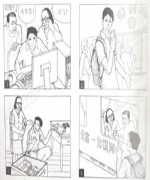E
How words came into being is unknown. All we assume (推测) is that some early men invented certain sounds, in one way or another, to express thoughts and feelings, actions and things, so that they could talk with each other. Later they agreed upon certain signs, called letters, which could be put together to show those sounds, and which could be written down. Those sounds, whether spoken or written in letters, are called words.
The power of words, then, lies in their associations—the things they bring up to our minds. Words become filled with meaning for us by experience; and the longer we tire, the more certain words bring back to us the happy and sad events of our past; and the more we read and learn, the more the number of words that mean something to us increases.
Great writers are those who not only have great thoughts but also express these thoughts in words which have powerful effects on our minds and feelings. This clever use of words is what we call literary style (文体). Above all, the real poet is a master of words. He can express his meaning in words which sing like music, and which by their position and association can move men to tears, We should therefore learn to choose our words carefully and use them correctly, or they will make our speech silly and common.
58.We learn from the text that language might have begun with________.
A.expressions B.actions
C.signs D.sounds
59.What is mainly discussed in Paragraph 2?
A.The learning of new words.
B.The importance of old words
C.The relation of human experience with words.
D.The gradual change and development of words.
60.In the last paragraph, what does the author suggest that we should do?
A.Use words skillfully. B.Make musical speeches
C.Learn poems by heart. D.Associate with listeners.
第二节 根据对话内容,从对话后的选项中选出能填入空白处的最佳选项。并在答题卡上将该项涂黑。选项中有两项为多余选项。
W: Hi, John.
M: Hi. Lucy. ________61________
W: Yes. I'm required to tell a story in English before the lesson begins.
M: Oh, I see. ________62________
W: You're right. I need to practice on the stage before they all come.
M: ________63________
W: Yes, here, in my pocket... Oops, where is it?
M: Don't worry, ________64________
W:... No, not in the bag. either. I' afraid I left it at home.
M: ________65________
W: Aha! It's just the key |o the classroom! Thank you so much.
A.Glad to see you.
B.What's the story about?
C.What's that around your neck?
D.Maybe you put it in your schoolbag,
E. Do you have the key to the classroom?
F. You're going to school rather early today.
G. S o you want to get to get to the classroom earlier to make some preparation?
















